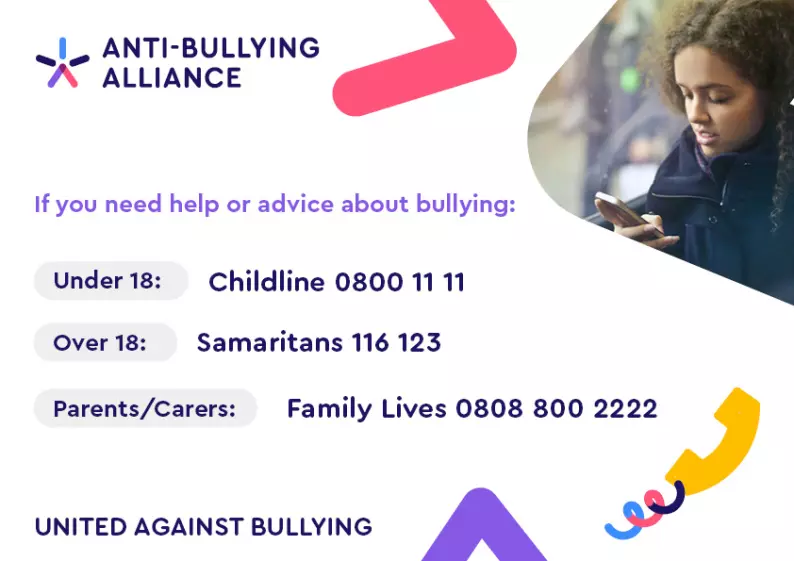- Home
- Safeguarding
- Anti Bullying
Anti Bullying

Please see below for a range of useful links to websites and contacts:
- Use our interactive anti-bullying information tool for parents and carers here.
- Family Lives (previously Parentline Plus) 0808 800 2222 - gives support and advice for parents on any aspect of parenting and family life, including bullying.
- Contact has a helpline for families with disabled children - they can give advice on bullying issues. You can contact them on 0808 808 3555 and visit their website for more information.
- The Child Exploitation and Online Protection Centre (CEOP) Provides help and advice on cyberbullying, the Centre maintains a website called Think U Know for children and young people, and parents and carers about staying safe online.
- Internet Matters Provides regularly refreshed content to support parents and carers with all aspects of e-safety. Includes lots of advice on technology that can help you to protect your child online and helpful content relating to cyberbullying.
- Kidscape Provide workshops for children that need support with bullying issues as well as a helpline for parents and carers
- NSPCC has a free helpline for parents and carers - 0808 800 5000.
- Red Balloon Learner Centres Red Balloon provide intensive, full-time education for children aged between 9 and 18 who feel unable to return to school because they have been severely bullied. There are Red Balloon Centres all over England, and they also have a programme of online support.
- Welldoing is an independent, UK-wide directory of therapists and counsellors who are all members of reputable professional organisations. There is a seperate search function for children and adolescents in need of therapists and counsellors. It also supplies information and advice in the areas of mental health, wellbeing and development.
- Counselling Directory provides a huge support network of counsellors, enabling visitors to find a counsellor close to them and appropriate for their needs.
- Stop It Now are a confidential helpline about child sexual exploitation.
- PACE (Parents Against Child Exploitation) have a parent helpline that can provide advice about online safety.
- Report Harmful Content Online (provided by the UK Safer Internet Centre and South West Grid for Learning) have a website which has support about reporting content.
How can I help my child if they are being bullied?
If your child is being bullied, don't panic. Your key role is listening, calming and providing reassurance that the situation can get better when aciton is taken.
Listen and reassure them that coming to you was the right thing to do. Try and establish the facts. It can be helpful to keep a diary of events to share with the school or college.
Assure them that the bullying is not their fault and that they have family that will support them. Reassure them that you will not take any action without discussing it with them first.
Don't encourage retaliation to bullying - such as violent actions. It's important for children to avoid hitting or punching an abusive peer. Reacting that way has negative and unpredictable results- they may be hurt even further, and find that they are labelled as the problem. Rather suggest that they walk away and seek help.
Find out what your child wants to happen next. Help to identify the choices open to them; the potential next steps to take; and the skills they may have to help solve the problems.
Encourage your child to get involved in activities that build their confidence and esteem, and help them to form friendships outside of school (or wherever the bullying is taking place).
Discuss the situation with your child's teacher or Head teacher - or the lead adult wherever the bullying is taking place. Every child has a right to a safe environment in which to learn and play. Schools must have a behaviour policy which sets out the measures that will be taken to prevent all forms of bullying between pupils. For more information on making a complaint about bullying, visit Making a complaint
Kidscape have created a log for parents that can help them record bullying and have a conversation about bullying with their child:
Kidscape Log & School Contact RecordHere is a link to a guide from Diana Award about supporting your child if they are being bullied:
What can I do if my child is being bullied?See here Dr Luke Robert's three tips for active listening blog which he wrote for Kidscape:
How to Report Bullying
Low Level Concerns
If a student wants to contact the school with a low-level concern, they have the following ways to report an incident:
- Speak to a trusted member of staff (Teacher, Tutor, Pastoral Link and Head of Year)
- Use the Student Voice App on the website: The Student Voice App
- Use Report & Support (link on website and physical reporting boxes): WSE Report & Support
Please be aware that to ensure that we respond quickly (in order to de-escalate potential further issues) and that we collate information together, a new email group will be set up – specifically for bullying.
If a Parent/Carer Feels that Bullying is Taking Place
If a parent/carer feels like that they would like to report an incident which they feel is bullying, they should contact the new incident email box for their year team. The following members of staff will be alerted:
- Year Team Pastoral Link
- Head of Year (and Deputy Head of Year where possible)
- Graham Newell (Assistant Headteacher - DSL)
Parents/carers will receive an immediate response, advising that we have received your email and that a member of the Pastoral team will be in contact within the next 24 hours. Please see the incident email lists:




